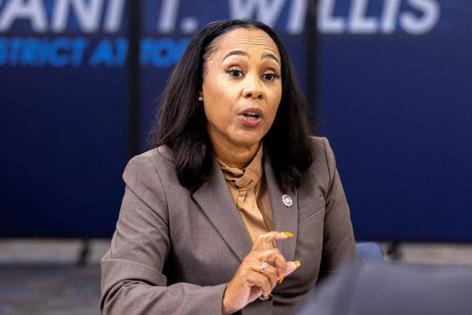Georgia Republicans can subpoena Fulton DA Fani Willis, judge rules
Published in Political News
ATLANTA — Georgia Republicans can subpoena Fulton County District Attorney Fani Willis about her romantic relationship with Nathan Wade, the outside attorney she hired to lead her 2020 election interference case against former and future President Donald Trump and his allies, a judge has ruled.
The decision by Fulton County Superior Court Judge Shukura Ingram was published Monday. It is the latest blow to Willis in regard to her prosecution of Trump. On Nov. 19, the Georgia Court of Appeals disqualified Willis and her office from the case due to her relationship with Wade.
Ingram rejected Willis’ arguments that GOP leaders of a state Senate committee didn’t have the authority to issue a pair of subpoenas in August seeking documents and her testimony. But the judge gave Willis until Jan. 13 to explain why the subpoenas shouldn’t be enforced.
“(Willis) claims that the subpoenas are overbroad and seek privileged and/or confidential information,” the judge said in her order. “This may very well be true, but this court needs more details on the basis for these objections from (Willis) before ruling on (committee members’) application for enforcement.”
Representatives for Willis did not immediately respond Friday to questions about the ruling.
Sen. Greg Dolezal, one of the committee members, mentioned the ruling in a social media post Friday.
“We’ll see you soon, Madam D.A.,” he wrote.
Dolezal, R-Cumming, has unveiled plans to extend the life of the committee into 2025. He told The Atlanta Journal-Constitution that Ingram’s ruling “follows the plain reading of the law as outlined in our committee.”
“From open records laws to lawfully issued subpoenas, D.A. Willis seems to think she is above the law,” Dolezal said. “Once again, the courts ruled otherwise.”
Ingram heard arguments from both sides during a hearing in Atlanta on Dec. 3.
Willis claimed the subpoenas from the Senate’s Special Committee on Investigations were void because the committee and its members lacked legislative subpoena power, issued the subpoenas while the Senate was adjourned and violated part of the Georgia Constitution.
Ingram disagreed.
“It is undisputed that the General Assembly has the unenumerated and implied constitutional power to conduct investigations and the statutory authority to issue subpoenas for the purposes of such investigations,” she said. “Here, the Senate, as a chamber, empowered itself to issue subpoenas, which it was authorized to do.”
The judge further said Willis failed to identify any authority to support her theory that the subpoenas could not be issued after the Legislature adjourned its regular session on March 28.
Ingram also said the Georgia Constitution allows members of one branch of government to investigate members of another branch.
The committee members offered to narrow the scope of the subpoenas, the judge noted. She gave them until Jan. 31 to respond to any objections Willis raises about enforcement of the subpoenas.
Senators created the committee in January, just weeks after news surfaced that Willis had been in a romantic relationship with Wade. Members sought years worth of communications between Willis and Wade as well as information about his hiring and pay, the DA office’s federal grant funding and interactions with the White House, Justice Department and members of Congress regarding the elections case.
They also sought to compel Willis’ attendance at a September hearing, which she declined to attend as she fought her summons in court.
©2024 The Atlanta Journal-Constitution. Visit at ajc.com. Distributed by Tribune Content Agency, LLC.




























































Comments